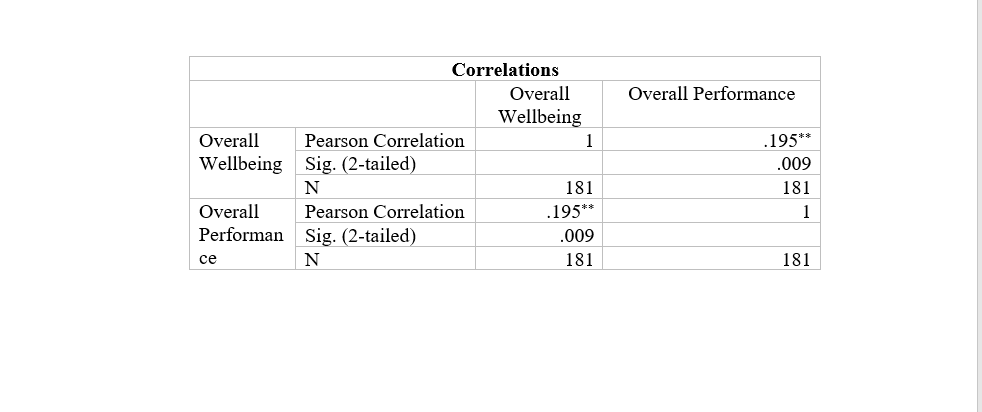The Impact of Employees Wellbeing on Performance: An Exploratory Study of the Employees’ Viewpoints in International Non-Governmental Organizations in the Kurdistan Region of Iraq
DOI:
https://doi.org/10.21271/zjhs.28.SpA.26Keywords:
Employee WellbeingPe, rformance Measurement, NGO’s, INGO’s, The Kurdistan Region.Abstract
Employee wellbeing has emerged as a compelling area of research in the fields of Human Resource Management (HRM) and organizational behavior. This study focuses on investigating the impact of employee wellbeing on job performance within International Non-Governmental Organizations (INGOs) operating in the Kurdistan Region of Iraq (KRI). The research hypothesis positsthose higher levels of employee wellbeing positively influence job performance. The primary aim is to explore the correlation between employee wellbeing and job performance, employing a quantitative approach through an online survey for data collection. A total of 181 individuals employed in INGOs participated in the study. The analysis revealed a robust positive correlation between employee wellbeing and job performance, suggesting that INGOs must exert significant efforts to enhance employee wellbeing. Furthermore, several recommendations are offered for academics, INGOs, and specifically human resource departments. Additionally, recommendations for future studies in this area are presented.
References
- Arthur, B. H., & Harold, R. F. (1951). An index of job satisfaction. Journal of Applied Psychology, 35(5), 307-311.
- Athota, V. S., & Malik, A. (2019). Managing Employee Well-being and Resilience for Innovation Evidence from Knowledge-intensive Service Industries. Cham: Palgrave Macmillan.
- Barling, J., & Cooper, C. L. (2008). The SAGE Handbook of Organizational Behavior. SAGE Publications.
- Campbell, J. P., Gasser, M. B., & Oswald, F. L. (1996). The Substantive Nature of Job Performance Variability. In K. R. Murphy (Ed.), Individual Differences and Behavior in Organizations (pp. 258-299). Jossey-Bass.
- De Simone, S. (2014). Conceptualizing Wellbeing in the Workplace. International Journal of Business and Social Science, 5(12), 118-122.
- Dewe, P. J., O’Driscoll, M. P., & Cooper, C. L. (2012). Theories of Psychological Stress at Work. In R. J. Gatchel, & I. Z. Schultz (Eds.). Springer.
- Francia, G., & Gautier, G. (2005). A Recent Story of NGOs in Northern Iraqi Kurdistan.
- Huang, L.-C., Ahlstrom, D., Lee, A. Y.-P., Chen , S.-Y., & Hsieh, M.-J. (2016). High performance work systems, employee well-being, and job involvement: an empirical study. Personnel Review, 45(2), 296-314.
- Huczynski, A. A., & Buchanan, D. A. (2020). Organizational Behaviour (Tenth Edition ed.). Harlow: Pearson Education.
- Judge, T. A., Thoresen, C. J., Joyce, B. E., & Patton, G. K. (2001). The Job Satisfaction-Job Performance Relationship: A Qualitative and Quantitative Review. Psychological Bulletin, 127(3), 376-407.
- Kanfer, R., & Ackerman, P. L. (2005). Work Competence: A Person-Oriented Perspective. In A. J. Elliot, & C. S. Dweck (Eds.), Handbook of competence and motivation (pp. 336–353). Guilford Publications.
- Laerd Statistics. (2018). Retrieved May 2021, from Laerd Statistics: https://statistics.laerd.com/spss-tutorials/cronbachs-alpha-using-spss-statistics.php
- Lang, S. (2013). NGOs, Civil Society, and the Public Sphere. Cambridge University Press.
- Leavy, P. (2017). Research Design. The Guilford Press.
- Lewis, D., & Kanji, N. (2009). Non-Governmental Organizations and Development. Routledge.
- Lyubomirsky, S., & King, L. (2005). The Benefits of Frequent Positive Affect: Does Happiness Lead to Success? Psychological Bulletin, 131(6), 803-855.
- May, D. R., Gilson, R. L., & Harter, L. M. (2004). The psychological conditions of meaningfulness, safety and availability and the engagement of the human spirit at work. Journal of Occupational and Organizational Psychology, 77(1), 11-37.
- NCCI. (2020). International NGOs. Retrieved April 2021, from NCCI: https://www.ncciraq.org/en/ngos#international-ngos.
- Oswald, A. J., Proto, E., & Sgroi, D. (2015). Happiness and Productivity. Journal of Labor Economics, 33(4), 789-822.
- Porath, C., Spreitzer, G., Gibson, C., & Garnett, F. G. (2012). Thriving at work: Toward its measurement, construct validation, and theoretical refinement. Journal of Organizational Behavior, 33, 250-257.
- Price, A. (2011). Human Resource Management (Fourth ed.). Hampshire : Brendan George.
- Pritchard, R. D. (1992). In M. D. Dunnette , & L. M. Hough (Eds.), Handbook of Industrial an d Organizational Psychology (2 ed., Vol. 3, pp. 443-472). Consulting Psychologists Press.
- Roe, R. A. (1999). Work performance. A multiple regulation perspective. In C. L. Cooper , & I. T. Robertson (Eds.), International review of industrial and organizational psychology (pp. 231-235). Wiley.
- Ryff, C. D., & Keyes, C. M. (1995). The Structure of Psychological Well-Being Revisited. Journal of Personality and Social Psychology, 69, 719-727.
- Saunders, M., Lewis, P., & Thornhill, A. (2016). Research Methods for Business Students (6 ed.). Pearson.
- Schmutte, P. S., & Ryff, C. D. (1997). Personality and well-being: Reexamining methods and meanings. Journal of Personality and Social Psychology, 73(3), 549-559.
- Shields, J. (2007). Managing Employee Performance and Reward - Concepts, Practices, Strategies. Cambridge University Press.
- Tennant, R., Hiller, L., Fishwick, R., Platt, S., Joseph, S., Weich, S., Parkinson, J., Secker, J. and Stewart-Brown, S., 2007. The Warwick-Edinburgh mental well-being scale (WEMWBS): development and UK validation. Health and Quality of life Outcomes, 5(1), pp.1-13.
- Van Scotter, J., Motowidlo, S. J., & Cross, T. C. (2000). Effects of task performance and contextual performance on systemic rewards. Journal of Applied Psychology, 85(4), 526–535.
- Viswesvaran, C., Schmidt, F. L., & Ones, D. S. (2006). Is there a general factor in ratings of job performance? A meta-analytic framework for disentangling substantive and error influences. Journal of Applied Psychology, 90, 108-131.
- Walker, R. M. (2008). An empirical evaluation of innovation types and organizational and environmental characteristics: Towards a configuration framework. Journal of public administration research and theory, 18(4), 591-615.
- Wanous, J. P., Reichers, A. E., & Hudy, M. J. (1997). Overall Job Satisfaction: How Good Are Single-Item Measures? Journal of Applied Psychology, 82, 247-252.
- Warr, P., & Ilke, I. (2012). Job Engagement, Job Satisfaction, and Contrasting Associations with PersonJob Fit. Journal of Occupational Health Psychology, 17, 129-138.
- Warr, P., Bindl, U. K., Parker, S. K., & Inceoglu, I. (2013). Four-Quadrant Investigation of Job-related Affects and Behaviours. European Journal of Work and Organizational Psychology, 23, 342-363.
- Watson, D., Clark, L., & Tellegen, A. (1988). Development and validation of brief measures of positive and negative affect: The PANAS scales. Journal of Personality and Social Psychology, 54, 1063-1070.
- WHO (2002). World Health Organization Health and Performance Questionnaire (HPQ). World Health Organization.
- Xanthopoulou, D., Bakker, A. B., & Ilies, R. (2012). Everyday working life: Explaining within-person fluctuations in employee well-being. Human Relations, 65, 1051-1069.
- Yaziji , M., & Doh, J. (2009). NGOs and Corporations - Conflict and Collaboration. Cambridge University Press.
- Zelenski, J. M., Murphy , S. A., & Jenkins, D. A. (2008). The Happy-Productive Worker Thesis Revisited. Journal of Happiness Studies, 9, 521-537.

Downloads
Published
How to Cite
Issue
Section
License
Copyright (c) 2024 Mehabad Sadi Ali, Dastan Mohammed Hamakareem

This work is licensed under a Creative Commons Attribution 4.0 International License.
Except where otherwise noted, content on this site is licenced
under a Creative Commons Attribution License 4.0 (CC BY- 4.0)









